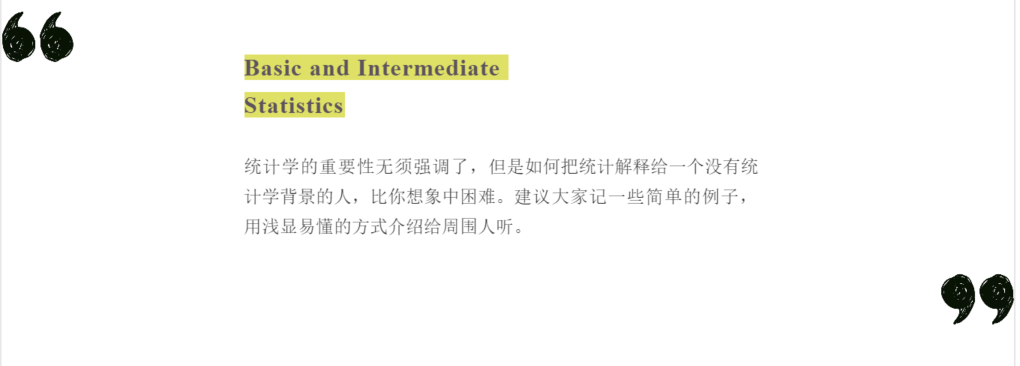
Business Analyst 面试必备的63个问题
商业分析师的面试一般分成 behavioral interview 和technical interview 两种。大家在准备面试的初期都会很迷茫,明明什么都会,但不知道该从何准备起。今天,我们就一起来看看命中率百分之90的面试问题都是哪些吧!
行为面试 Behavioral Interview Question
Q1: Tell me about this project you have done.
解释你做过的 project
Q2: Tell me about a time when you had to go above and beyond the call of duty in order to get a job done.
告诉我你需要付出职责之外的努力去完成一个任务的故事。
Q3: Tell me about a time when you had too many things to do and you were required to prioritize your tasks.
告诉我你手上有很多事情要干,然后你需要排好优先次序的一个故事。
Q4: Give me an example of a time when something you tried to accomplish and failed.
给我一个当你尝试去做一件事却失败了的例子。
Q5: Give me a specific example of a time when you used good judgment and logic in solving a problem.
给我一个具体的例子 — 你用很好的判断和推理去解决一个问题。
Q6: Tell me about a time when you had to work under pressure or extreme conditions.
告诉我你怎么在压力很大或在很极端的条件下工作的。
Q7: Tell me about your best and/or worst team experience — and your role in it.
告诉我你一个最好的和/或最差的团队经历。
Q8: Give an example of a difficult situation you’ve faced and how you handled it.
给我一个例子 — 你面对的一个困难的形势,以及你怎么处理这种情况的。
Q9: Have you ever had a disagreement with a co-worker or boss? How did you handle it?
你曾经有和同事或者老板意见不一致吗?你是如何处理这种情况的?
Q10: Give two examples of things you’ve done in previous jobs that demonstrate your willingness to work hard.
给我两个在你以前实习或者工作中可以展现你愿意努力做事情的例子。
Q11: Some people consider themselves to be “big picture people” and others are detail oriented. Which are you? Given an example that illustrates your preference.
有些人视他们为 big picture people,有些人视他们为细节控,你是哪一种?给我一个例子去解释你的选择。
Q12: Give me an example of a time when you solved a complex analytical problem.
给我一个你解决一个需要分析复杂问题的例子。
Q13: Give me an example of a time when you solved an analytical problem in an environment of ambiguity.
给我一个例子 — 你如何解决一个含糊不清的分析相关的问题。
技术面试 Technical Interview Question

Q1: What is the default value of the last parameter of VLOOKUP?
VLOOKUP最后一个默认的参数是什么?
Q2: What is the main limitation of the VLOOKUP function?
VLOOKUP主要的缺点是什么?
Q3: Does VLOOKUP look up case-sensitive values?
VLOOKUP会区分大小写吗?
Q4: 2 ways to extract unique values in excel
两个在Excel调取唯一值的方法。
Q5: How to find duplicates in a column?
如何在一栏里寻找重复出现的值?
Q6: How to insert a drop down?
如何插入下拉菜单?
Q7: How to sum values based on some conditions?
如何根据一些条件进行加和?
Q8: How to create cross tabulation in Excel?
如何在Excel里创建交叉列表?
Q9: What is Excel Array Formula?
什么是Excel Array Formula?
Q10: How to extract the First Name from a full name?
如何从一个人的姓名里调取他的名?

Q1: What is p-value?
什么是 p-value?
Q2: How are confidence intervals constructed and how will you interpret them?
Confidence interval 是如何创建的,以及你是如何解释他们的?
Q3: In which data types MEAN, MEDIAN and MODE are more suitable?
在什么数据类型中,平均数、中位数或常数更加适合?
Q4: Different Types of Sampling Techniques?
不同类型的采集样本方式?
Q5: Difference between Cluster and Stratified Sampling?
聚类和分层抽样的区别是什么?
Q6: When should we use T-test than Z-test?
我们什么时候应该用T-test,而不用Z-test?
Q7: What is the difference between R-square and Adjusted R-square?
R-square和Adjusted R-square的区别是什么?
Q8: How to detect outliers?
如何探测outliers?
Q9: Define Homoscedasticity?
什么是同方差性?
Q10: What is logistic regression? Or State an example when you have used logistic regression recently.
什么是逻辑回归?你能说出一个你最近用逻辑回归的例子吗?
Q11: What is the random forest?
什么是随机森林?
Q12: How to conduct t-test?
如何进行t-test?
Q13: What do you understand by the term Normal Distribution?
你如何理解正态分布的?
Q14: What are Interpolation and Extrapolation?
什么是插值和外推?
Q15: What is K-means? How can you select K for K-means?
什么是K-means?你如何选择K的?
Q16: What is the goal of A/B Testing?
A/B Testing的目的是什么?
Q17: How to statistically compare means between groups?
统计学里是如何比较不同组别的平均数的?
Q18: Explain eigenvalues and eigenvectors intuitively
请用用浅显易懂的方式解释特征值和特征向量。

Q1: Python or R Which one would you prefer for text analytics?
对于文本分析,你喜欢用Python还是R?
Q2: Write a function that takes in two sorted lists and outputs a sorted list that is their union.
请写一个function,让它包括两个整理好的列表,只输出一个合并列表。

Q1: How to write conditional statements (IF ELSE) in SQL?
如何在SQL里写条件语?
Q2: What are the common SQL data types?
SQL常见的数据类型有什么?
Q3: How to subset or filter data in SQL?
如何在SQL里取子集,或者筛选数据?
Q4: Difference between WHERE and HAVING clauses.
Where和Having语句的区别是什么?
Q5: Difference between Full Join and Cross Join?
如何区分full join和cross join?
Q6: Difference between UNION and UNION ALL
如何区分Union和Union All?
Q7: How to create a blank table?
如何创建一个空白的表格?
Q8: What will be the result of the query below?
一般会写个query,问你在SQL里跑这个query得到的结果是什么?
Q9: Suppose you have a table named TEMP. You need to recode values of column Y, Swap values 2 and 3 in column Y
假设你有一个表格叫做TEMP,你需要重新编码Y栏的值——交换Y栏的第二个值和第三个值。如何在SQL实现?
Q10: Identify second maximum value?
如何在SQL里找出第二大的值?
Q11: Identify second maximum value by a group
如何在SQL里找出在一个组别里第二大的值?
Q12: Is the query below correct? If not, what’s the issue?
可能会写一个query,让你判断对不对,如果不对,找出其中的错误。

Q1: What is the difference between Supervised Learning an Unsupervised Learning?
监督学习和无监督学习的区别是什么?
Q2: How can outlier values be treated?
如何处理异常值?
Q3: How can you assess a good logistic model?
你如何评定一个好的逻辑回归模型?
Q4: What are the various steps involved in an analytics project?
在一个分析项目里,有什么比较典型的步骤?
Q5: During analysis, how do you treat missing values? 你如何处理缺失值的?
Q6: What is the difference between Bayesian Inference and Maximum Likelihood Estimation (MLE)?
贝叶斯推理和最大似然估计的区别是什么?
Q7: What is Machine Learning?
什么是机器学习?
Q8: Is it better to have too many false negatives or too many false positives?
犯很多第一型错误和犯很多第二型错误两个之间,你选择哪一个?
作者:谢童
校对审稿:卡里
原文来自 Glassdoor





